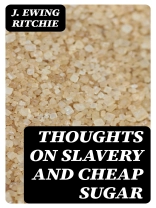In ‘Thoughts on Slavery and Cheap Sugar, ‘ J. Ewing Ritchie delves into the intricate relationship between the sugar industry and the moral implications of slavery during the 19th century. Through a combination of persuasive rhetoric and meticulous analysis, Ritchie presents a powerful indictment of the economic systems that perpetuate human suffering. Employing a clear, accessible prose style, he weaves together historical context with vivid illustrations that reveal the brutality of slavery while critiquing the societal complicity in the consumption of cheap sugar. The work serves as both a cogent argument and a call to ethical action amidst the prevailing attitudes of his time. J. Ewing Ritchie, a prominent social commentator and journalist of the Victorian era, was deeply influenced by the socio-political climate of his day. His career in journalism provided him with a platform to express his views on pressing social issues, and his opposition to slavery was fueled by a moral sensibility informed by religious beliefs and strong humanitarian principles. Ritchie’s engagement with the abolitionist movement underscores his commitment to social justice, making this work a significant contribution to anti-slavery literature. I highly recommend ‘Thoughts on Slavery and Cheap Sugar’ to scholars, students, and general readers interested in 19th-century social issues, ethics, and the historical intersections of commerce and human rights. Ritchie’s impassioned exploration of slavery’s moral implications remains relevant today, challenging us to reflect on our own consumption choices and the human cost behind them.
Despre autor
J. Ewing Ritchie (1820–1898) was a prolific British journalist and writer, remembered primarily for his commentary on social and political issues of his time. Born in the early nineteenth century, his work extended into the Victorian era, providing insightful reflections on the pressing societal concerns of the period. Ritchie’s literary style is notable for its clarity and engagement with topics of moral and ethical importance, often reflecting the reformist attitudes that were prevalent among progressive thinkers of his day.
One of his significant works, ‘Thoughts on Slavery and Cheap Sugar’ (undated), sheds light on the contentious issues of the slave trade and the economics of sugar production, both of which were deeply intertwined with British commercial interests and moral discourse. In this text, Ritchie grapples with the complexities of supporting cheap sugar imports while also advocating for the abolition of slavery, illustrating the duality of British economic dependency on the sugar colonies and a growing moral consciousness. Ritchie’s body of work captures his commitment to social reform and his contributions to abolitionist literature, highlighting the often-overlooked economic arguments within the wider anti-slavery movement. His writings continue to serve as valuable resources for those studying Victorian socio-political thought and the evolution of humanitarian principles during the nineteenth century.












